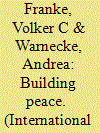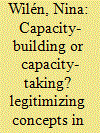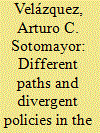|
|
|
Sort Order |
|
|
|
Items / Page
|
|
|
|
|
|
|
| Srl | Item |
| 1 |
ID:
089348


|
|
|
|
|
| Publication |
2009.
|
| Summary/Abstract |
After a brief introduction, this contribution comprises a tabular inventory of the 69 UN peace missions since the end of the Cold War. It highlights the structural features of each mission, the background to crisis and the mission's contributions to security, socio-economic well-being, governance, justice and reconciliation.
|
|
|
|
|
|
|
|
|
|
|
|
|
|
|
|
| 2 |
ID:
089343


|
|
|
|
|
| Publication |
2009.
|
| Summary/Abstract |
This article critically analyses capacity-building and local ownership in the context of UN peace operations through interviews with UN staff and NGO representatives in Liberia and Burundi. The argument is that these concepts are left ambiguous and undefined to avoid accountability for peace operations while still functioning as value-adding and legitimizing discursive instruments for the latter. This article proves that the many paradoxes and contradictions surrounding the concepts clearly deter their operation in practice, while their positive connotations remain important, discursively, as legitimizing tools.
|
|
|
|
|
|
|
|
|
|
|
|
|
|
|
|
| 3 |
ID:
089345


|
|
|
|
|
| Publication |
2009.
|
| Summary/Abstract |
How can we explain foreign policy variation among UN member states? Brazil and Mexico are the most likely cases for international primacy in the UN system, given their territorial dimension, demographic tendencies, economic importance, geopolitical location and relative weight in Latin America. Yet, despite their structural similarities, their policies and behaviour in the UN system have varied, both in terms of engagement with the Security Council and commitment regarding peacekeeping. By comparing two of Latin America's most influential countries, this study identifies the underlying conditions and mechanisms that explain their differences in behaviour and policy in the UN. In particular, this article analyses and contrasts how geopolitics and civil-military relations in Brazil and Mexico affect their incentives to participate in international organizations and their overall international commitment to peace.
|
|
|
|
|
|
|
|
|
|
|
|
|
|
|
|
| 4 |
ID:
089344


|
|
|
|
|
| Publication |
2009.
|
| Summary/Abstract |
Concerns have been expressed with regard to the public health impact of HIV-positive peacekeepers in the countries in which they serve. This article tests three common contentions: (1) that troop contributing countries have higher prevalence than that of the host country; (2) that HIV prevalence of the peacekeeping mission is higher than that of the host country; and (3) that peacekeepers have a large public health impact on the HIV epidemics of the host countries. Using 2008 prevalence data as well as mission information from the UN Department of Peacekeeping Operations, this article argues against these notions.
|
|
|
|
|
|
|
|
|
|
|
|
|
|
|
|
| 5 |
ID:
089342


|
|
|
|
|
| Publication |
2009.
|
| Summary/Abstract |
This article examines the allocation of roles and responsibilities in the construction of UN peacekeeping. The case is made that decision making in UN peacekeeping is not only fragmented between various states and institutional actors, but also critically lopsided, with an uneven distribution of responsibilities and the majority of political, military and strategic risks falling upon those countries least able to bear them - poor and weak states. States that hold decision-making power are not the states that have to implement those decisions. The article concludes by arguing that this governance structure is not a symptom of organizational dysfunction, but that it serves a political function by allowing influence to be wielded without risk.
|
|
|
|
|
|
|
|
|
|
|
|
|
|
|
|
| 6 |
ID:
089347


|
|
|
|
|
| Publication |
2009.
|
| Summary/Abstract |
Following the 2006 gang violence in Timor-Leste amid dissension between the two main security institutions in the country, the Timor-Leste Defence Force (F-FDTL) and the National Police of Timor-Leste (PNTL), the UN Security Council adopted Resolution 1704, establishing a UN multidimensional, integrated mission, including UN police with an executive policing mandate, to ensure the restoration and maintenance of public security. With the mission winding down in 2009, this article offers an early assessment of its accomplishments and setbacks in the realm of security and public order, emphasizing the UNPOL leg of the mission. If the mission succeeded in restoring a modicum of security in Timor-Leste, it fell short of effectively assisting the PNTL reform process, implying that another security crisis erupting in the country cannot be ruled out.
|
|
|
|
|
|
|
|
|
|
|
|
|
|
|
|
| 7 |
ID:
089346


|
|
|
|
|
| Publication |
2009.
|
| Summary/Abstract |
Timor-Leste was shaken by a violent national crisis from April 2006 to April 2008. This article examines the role that youths played in the crisis by providing an empirical mapping of the groups involved and the dynamics provoking youth participation in violence. Martial arts groups, ritual arts groups and bairo youth groups were dominant in the street violence that left Timor-Leste in turmoil, notably in Dili. The presence and agitation of their members helped to escalate and perpetuate the crisis. This was facilitated by the sheer scale of the groups' memberships, a fluid socio-cultural situation caused by political unrest, and widespread discontent among a young generation detached from the solidarity of Timor-Leste's resistance era.
|
|
|
|
|
|
|
|
|
|
|
|
|
|
|
|
|
|
|
|
|